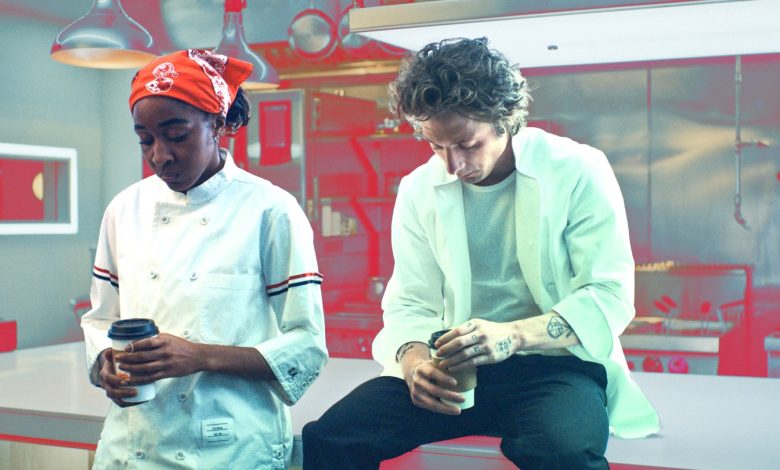‘The Bear’ Is Really a Work Warning for All of Us

At the end of The Bear‘s fourth season, Carmy (Jeremy Allen White) withdraws his stake in the restaurant and declares he’s leaving the culinary industry altogether. In what can be described as either an act of martyrdom or growth, he acknowledges that all of his work has been linked to his familial trauma and gives Richie (Ebon Moss-Bachrach) his stake, making his cousin, sister Natalie (Abby Elliott) and restaurant partner Sydney (Ayo Edebiri) its three owners.
For a show that has spent all this time exploring the duality of abuse and resilience within the toxic kitchens of America’s restaurants, it’s a somewhat risky move. But through Carmy’s choice, The Bear captures not just how we can use work to process, escape or bury our trauma, but also potentially destroy ourselves, our work and our relationships doing the things we love.
That’s not a particularly new thread for the series, which has spent four seasons exploring the destructive nature of passion, inspiring a wave of pieces about the restaurant industry and its many problems. But what has made the FX series one of TV’s biggest hits is how it uses the professional kitchen to speak to a larger truth of toxic workplaces and mental health.
As Americans, we spend an estimated third of our lives working, and that work is seen by many as a major metric for evaluating self-worth. So if work offers feelings of joy, accomplishment or success, then you must be doing “well,” right? That’s complicated in a culture where both blue- and white-collar Americans are working more than ever while facing stagnant pay and fewer promotions amid rising costs. It’s a modern work culture in which jobs are also increasingly encroaching on our personal lives — from homes becoming offices (and as we front that cost) to personal devices delivering more work emails and messages in off-hours.
It’s harder to escape work, and as a result, American workers are facing more and more psychological and physical strain, leaving “work-life balance” in the dust. For those who don’t have healthy mechanisms for dealing with their trauma, that can be appealing. Everyone knows that the relentless speed of Carmy’s kitchen, and his more recent obsession with reimagining The Bear’s daily menu, has been equally ambitious and outlandish. But if your work is how you bury your feelings, reimagining your restaurant every 24 hours — while creating an endless stream of impossible goals and expectations — means you’ll never have time to think about those feelings.
Instead, you can pile on more and more, distract yourself through the work and justify it all by the moments it’s successful. In the meantime, you’re chipping away at your sleeping, eating, relationships and other interests, becoming emotionally dysregulated and cycling among bouts of mania, fatigue, disassociation, anxiety and overstimulation. Destroying yourself for a job you need but hate while trapped in a cycle of survival and responsibility isn’t the same as choosing a job you love that ultimately hurts you. As someone in the latter category, I know some people love work that doesn’t love them back — and there’s a reason why they like that dynamic.
When I was 25, my mother died at 51 because she couldn’t stop working. On paper, it was kidney failure following a series of undertreated disabilities and medical emergencies exacerbated by being a single parent working 40-hour-plus weeks in a position that was toxic and abusive. But even as she became increasingly sick and people began to tell her to retire early, she wouldn’t stop. Ask anyone who knew her, and they’ll tell you why: She loved the work she did.
Carmy’s complicated relationships (to work, alcohol) are learned responses from his mother, Donna (Jamie Lee Curtis), and something most recognize as a coping mechanism. For nearly a decade, I followed my mother on the path of weaponizing my work to find temporary relief from the mental discomfort and emotional pain of losing her. In our culture, (over)dedication to our jobs is championed, but like addiction, it can be destructive. I’m not sure I would’ve even realized that if I wasn’t so quickly losing everything: friends and time with family, but also emotional regulation, mental and physical health and, ultimately, the drive to do what I supposedly loved.
From the first season of The Bear, Carmy’s been racing against a ticking clock — to save the restaurant, to reopen it, to make it profitable, to prevent his own implosion. With every new goal or demand, he’s pushed himself and his kitchen further, resulting mostly in skin-of-their-teeth success. It’s also created a fresh trail of injuries fueled by constant professional chaos, leaving less time and energy to tend to older wounds etched by familial trauma.
And that’s the whole idea. Carmy has given himself to his career and The Bear, not just because it’s easier to explain away how you’ve destroyed yourself for something you love but because transforming your dead brother’s restaurant into a success in his honor is easier than addressing why you ran away from him and your family to begin with.
But that’s also why Carmy’s decision to leave The Bear isn’t just his avoidant coping mechanism. It’s a sign of his resilience. For Carmy to get off the path of completely destroying what he and his crew love, he must accept that growth and healing will not always come from pushing through. No matter how many things or people you put between you and the bear, you cannot outrun it. You cannot outrun your trauma. You have to stop, get off the path and look it in the face.
Source: Hollywoodreporter
HiCelebNews online magazine publishes interesting content every day in the TV section of the entertainment category. Follow us to read the latest news.
Related Posts
- Dave Chappelle Shouts Out David Letterman During Screening of His Unreleased Doc
- Emma Thompson on Pulling “Every Single Muscle” Playing “a Real Heroine” in Action-Thriller ‘Dead of Winter’ — and What “Really Scared” Her
- TV’s Top Shows Are Flirting With Disaster
- ‘Dracula’: Radu Jude Explains How His Film Uses AI, Deconstructs the Myth and Pays Homage to Cinema
- Janet Nelson Berger, Casting Director on Prestige TV Programs, Dies at 87





